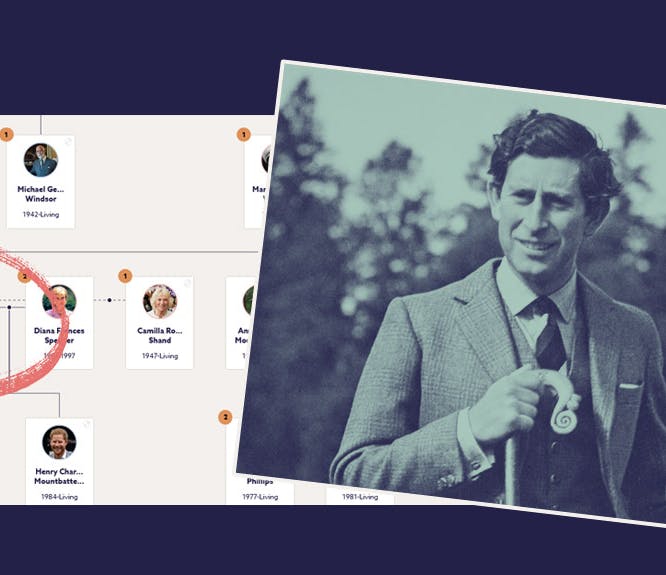The resources you need to discover Caribbean ancestors
4-5 minute read
By Guest Author | October 24, 2020
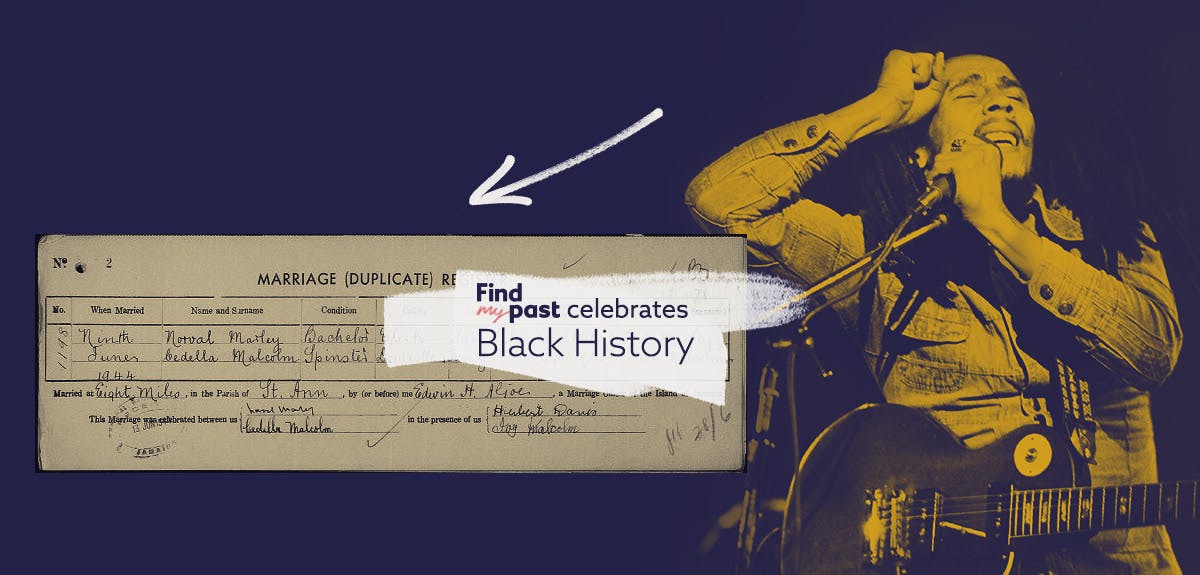
If you're one of the many people wanting to trace your people back to their origins in the Caribbean, Sharon Hintze's guide is for you.
Start your Caribbean family history journey by writing down what you think you know and then ask every conceivable living family member in any country what they know. Many people who came to the UK in the '50s and '60s are no longer living but they may have siblings or children who can help.
Findmypast has a list of questions you can ask them. Funeral programmes often have lots of useful photos and information. Chasing down how to contact a relative in the US is definitely worth your time. When you have organised your findings, noting the bits which don’t seem to be consistent, you should be ready to look for records.
Caribbean family history records
Twenty years ago, researching Caribbean records would have been a lot trickier than it is today, with so many resources now online. Former British colonies in the Caribbean will be the focus here, with emphasis on what you can do online with a Findmypast subscription, or on other free sites. Let’s start with the island that thousands of Britons claim as their ancestral home: Jamaica.
Jamaica
Findmypast offers three types of records for people living in Jamaica: civil registration (births, marriages and deaths), military records and newspapers.
Most important is civil registration which started around 1878 in Jamaica. Go to Findmypast's All Record Sets page and change the filter country from United Kingdom to Jamaica. Bob’s your uncle! Three civil registration record sets appear. It helps if you know the parish your family lived in and remember to be flexible with spellings. Birth registrations are not online much past 1930, but deaths go into the 1990s.

A Jamaican birth certificate for Cedella Malcolm, Bob Marley’s mother. On it, she is called Sidella Editha Malcolm. She was born in 1926. View the full record.
Cedella Malcolm was the name used when she was married to Robert Norval, who was much older than she was and white. Bob Marley was their only child.
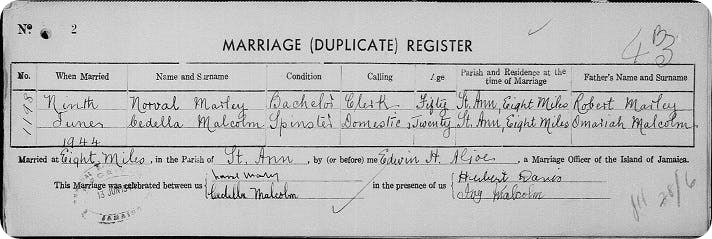
The 1944 marriage certificate of Cedella Malcolm and Norval Marley. View the full record.
You may have noticed that the information on the birth and marriage record is almost the same as on certificates in England and Wales. Being a British colony had its downsides. One of the great upsides was that British record-keeping standards, both for church records and civil registration, were faithfully reproduced in many British Caribbean islands. You can find more information from the current Jamaican Registrar General’s Office.
As for military records, Jamaican soldiers were part of the British Army until independence, so their records can be found in Findmypast's vast British Army collection. Black soldiers were frequently subject to racism, with few becoming officers. You'll find Jamaican military ancestors in record sets such as:
- British Army Service Records
- British Army First World War Casualty Lists
- British Army Casualty Lists 1939-1945
During the First World War, a British West Indies Regiment was created for Black soldiers in 1915, with 12 battalions up and running by 1918. About half of the members of this Regiment were from Jamaica. The Commonwealth War Graves Commission lists burials for 1,418 members of the British West Indies Regiment which are free to search. Be sure to include the British West Indies Regiment in your search.
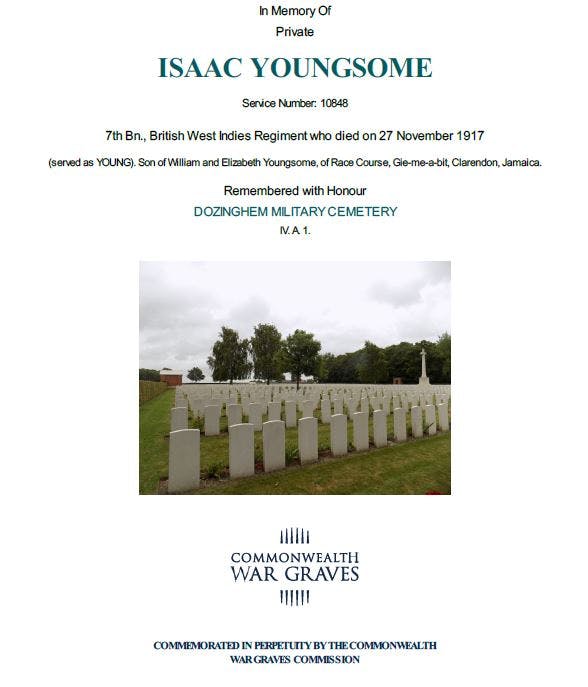
A Commonwealth War Graves' certificate commemorating a Jamaican soldier. View the full record.
The CWGC certificates are useful not least because they give the soldier’s service number, which can then be used to search other military record databases.
You'll also find Jamaican newspapers and gazettes on Findmypast. The oldest by far is the Royal Gazette of Jamaica 1780-1840. In this early gazette, Black Jamaicans seem to be mostly reported as participants in court cases or as runaway slaves.
Much more promising from a genealogical point of view is the Kingston Gleaner, found in a group of five Jamaican publications in Findmypast's US & World newspapers. The Gleaner online offerings start in 1901 and continue until about 2013.
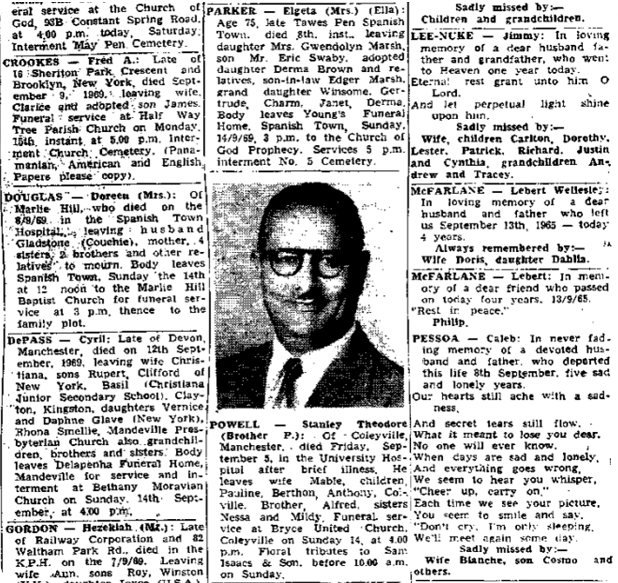
An example of death notices published in the Kingston Gleaner on 13 September 1969. Read the full article.
Other free resources include Church of England records of baptisms, marriages and burials from 1664-1880 on FamilySearch, which help to fill in the years before civil registration.
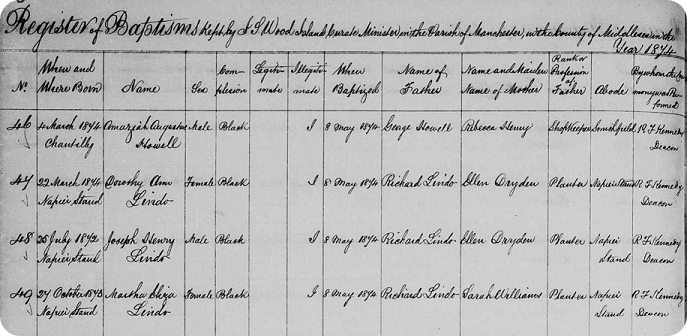
These baptism records from 1874 not only record skin colour but also fathers of children born out of wedlock.
Lastly, there are loads of Jamaican materials including directories and probate records on Patricia Jackson’s free Jamaican Family Search website. And just for fun, you can see some lovely drawings of Jamaica, made by James Hakewill in 1825, here.
Barbados
As with Jamaica, colonial record-keeping has proved a bonus for researchers trying to trace roots in Barbados. Findmypast has seven Barbadian record sets, some of which include digitised images of the original records.
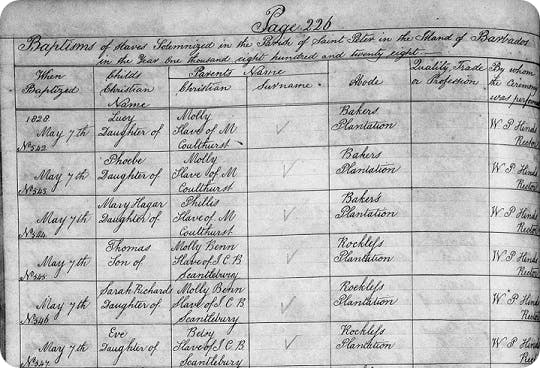
This baptismal register from 1828 is dedicated to slave baptisms. View the full record.
These unique records give extensive information about the plantation the slave child was born on.
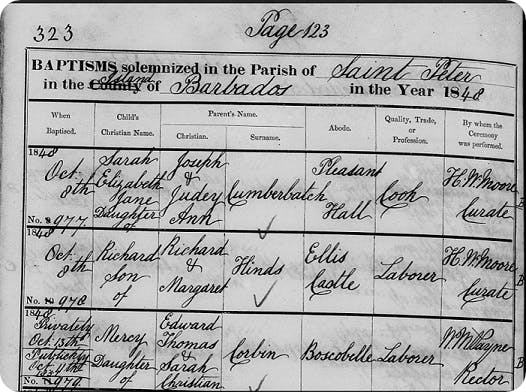
This 1848 Barbados baptism record is more conventional than the slave register but it is harder to tell the child's race.
Both of these examples illustrate that, when it comes to their quality and the detail they provide, Barbadian records are on a par with English parish records from the same era.
Barbadian church records include other denominations besides the Church of England. Methodists, Moravians, Jewish and Catholic congregations also recorded life events that are all searchable online. On FamilySearch, the specific dates and religions are included in the catalogue entry.
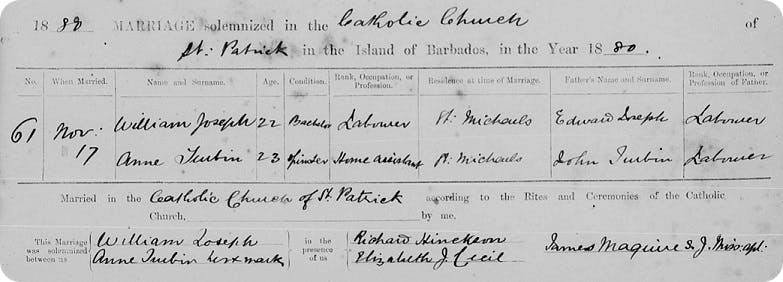
A Barbadian Catholic marriage register from 1880 via FamilySearch.
For Barbados, you will find military records in the same British record sets mentioned for Jamaica. Barbadian soldiers were also part of the British West Indies Regiment in World War 1.
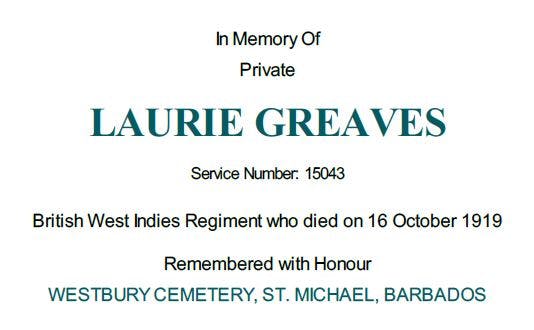
An entry from the Commonwealth Graves Commission for a Barbadian soldier.
As for historical newspapers online, for Barbados you will need to turn to the Digital Library of the Caribbean where there are more than 5,000 issues of six different publications, but not any long continuous series.
Other Caribbean islands
Findmypast has some 19th-century civil registration transcriptions for Grenada (1866-1891) and The Bahamas (1850-1891). FamilySearch has a vast archive of records for most Caribbean Islands. Use the FamilySearch catalogue to enter the name of a country to see what's available. Many church and civil registration records, as well as cemetery records, are available and most include digitised copies of the original documents. You'll find records for most English language countries include Anguilla (& St Kitts), The Bahamas, The British Virgin Islands, Dominica, Grenada and Turks & Caicos.
Another resource covering all of the British Caribbean is the Centre for the Study of the Legacies of British Slave Ownership, established at University College London. A great deal of data about estates, individuals, maps and various kinds of legacies are gathered together in one place. For the first time, this allows you to access the history of estates, entries in the Jamaica Almanac, Slave Compensation Claims and more. If your ancestors were slaves and not owners and you know the plantation they were on, you could learn a great deal about their home.
Don’t be discouraged if you have trouble tracing Caribbean ancestors at first. Keep going. After all, exploring your family history is a journey, not a destination. Consider storing your discoveries online with the Findmypast family tree builder and be sure to scan and upload your family photos, documents and heirlooms so they're preserved forever.
Related articles recommended for you
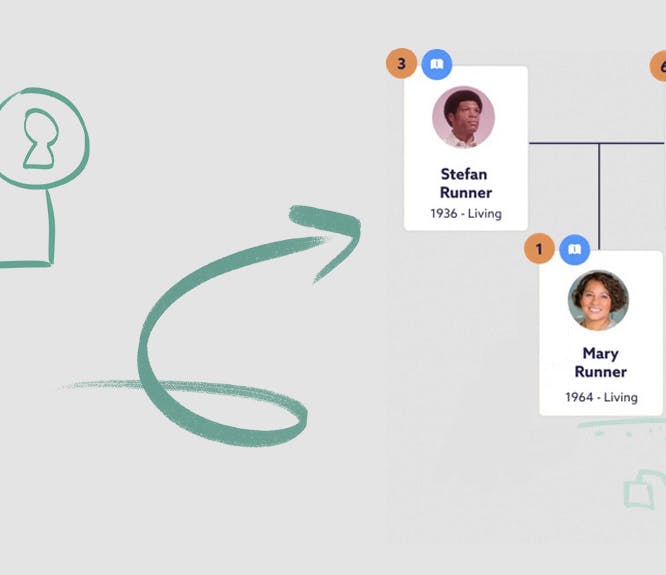
Everything you need to know about importing and exporting family tree GEDCOM files
Build Your Family Tree
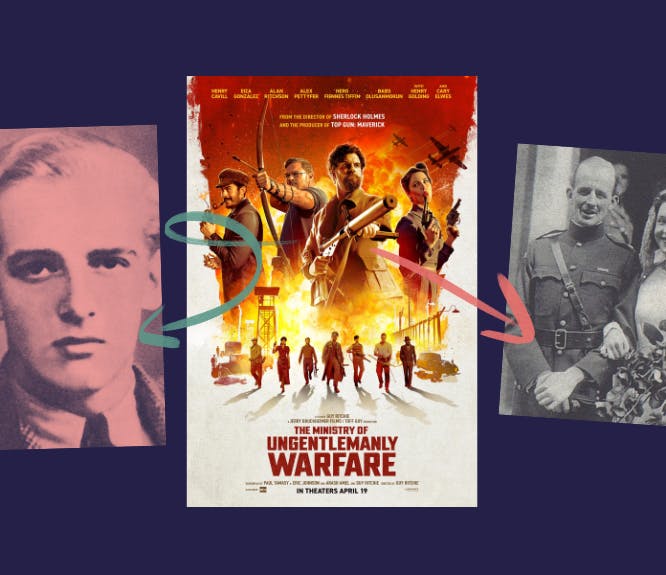
The incredible true story behind The Ministry of Ungentlemanly Warfare
History Hub
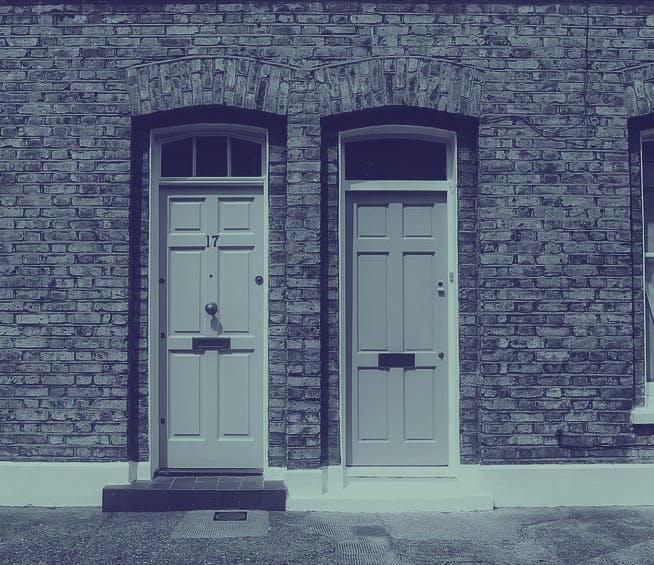
Here's how to overcome nine common house history research challenges: our expert's top tips
Help Hub
